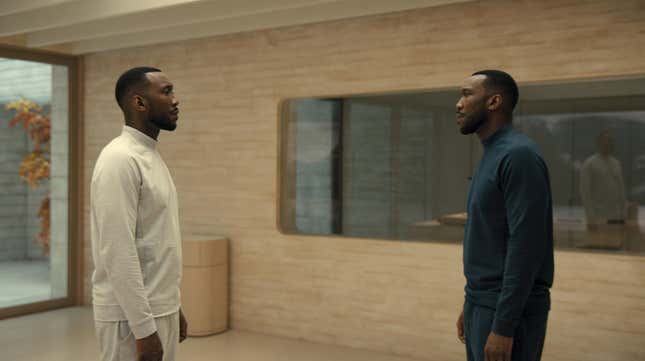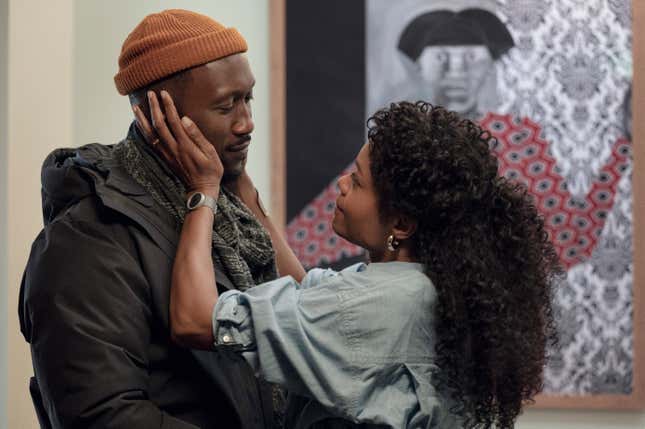
If you could prevent your loved ones from experiencing the grief associated with losing you in the event of an untimely passing, would you? To what lengths would you go? How much would you be willing to sacrifice?
Those questions and more are at the forefront of the upcoming Benjamin Cleary-directed sci-fi drama Swan Song, starring Moonlight actors Mahershala Ali and Naomie Harris, along with Glenn Close and Awkwafina.
Set in the not-so-distant future, the film—which first debuted at AFI Fest in November and boasts Ali’s first lead role in a feature—intricately touches on themes of morality, humanity and the feeling folks often say conquers all: love. The latter is tried and tested against the backdrop of a devoted father and husband, Cameron ( Mahershala Ali), who is suffering a terminal illness. Seeking to spare his wife Poppy (Naomie Harris), young son and unborn child the burden of his death and loss, Cameron participates in a treatment that would allow a replicant double, “Jax” (also played by Ali with impeccable depth and restraint) to take his place without his family’s knowledge. (Note: If this plot feels vaguely familiar, it’s because it was also recently explored by another veteran actor, Anthony Mackie in an episode of the Amazon Prime Video series Solos earlier this year.)
What ensues next is for Cameron is a highly emotional, mind-bending internal struggle as he tries to come to grips with the fact that Jax will continue to live out the life he planned for himself with the ones he loves most. A touching amalgamation of the complexities of both reality and identity, Swan Song poses the universal question of “What would you do?,” all while painting a challenging and vivid picture of what it looks like to both live and die for the ones you love.
The Root recently got the chance to chat with Mahershala Ali, Naomie Harris and director Benjamin Cleary to discuss the intricacies of Swan Song and what they hope audiences walk away with by the film’s ending.
*This interview has been edited and condensed for clarity.

The Root: Mahershala, when you first received the script and realized you’d essentially be playing the same character interpreted in two different ways, what was your approach to bringing Cameron and Jack to life distinctively?
Mahershala Ali: I just knew I needed to be really clear on their differences from the standpoint of what they wanted. And I was, sort of, proved right in the process of making it from just how I felt. Like, if I was clear on what Cameron wanted, I just felt like a different person than Jack. It was clear to me that they sort of had opposing views in a certain way, even though essentially, they wanted the same thing: the family to be healthy and whole. But that means one of them is not going to be there. And so, I started out with just trying to have a real clear understanding of what they wanted and how that was different.
And then, I also had to just keep in mind how different the power dynamic was and that anytime they’re in a scene together, more times than not, Cameron is the one in power. So therefore, Jack has to sort of always stay in this little brother, subservient position to Cameron. And that really impacts your body language and just how every thought is processed and every line is delivered.
And lastly, I will say just being conscious of a couple physical differences. The way we shot it, there was no way for me to go lose 20 pounds for one character and be heavier and healthier for one character but what I could do was be conscious of my pace and sort of like my rhythmic, my breathing, and know that Cameron was dealing with his real health issues where Jack was actually healthy. So the differences are subtle but I think that they are strong enough to give you two different characters.
TR: Cameron’s decision to follow through with the cloning procedure is tied heavily to his desire to shield his family from the horrors of his illness and the burden of grief. Stereotypically, grand sacrifices like that are expected of the women of the family: the mom, the grandmother, etc. How radical, if at all, was it for you Naomie and Mahershala, to step into a project where the male of the family, the head of the household, is making such concessions?
Naomie Harris: You know, I’d never even thought of it like that? That’s absolutely interesting and you’re right. When I think about it in terms of what I saw when I was growing up: it was the women in my family who made the sacrifices so this is unusual to see—but beautiful, you know?
For me, it’s about those that you love making sacrifices for them regardless of the sex or who you are. Poppy makes sacrifices for Cameron, which is why he loves her so much and why he’s willing to make sacrifices for her. And I think what’s so special about it is what they share is this kind of sacrificial love. And it’s true love. Most of the time you see this sort of, romantic, first crush kind of romance where people don’t really know each other and there’s nothing sacrificial about it at all. It’s just fulfilling needs really, whereas these two deeply know each other, have been together a really long time and it demonstrates the true nature of love. The true nature of love is sacrificing for the other person and they both do that in different ways.
MA: I feel like, if you look at the trajectory of their relationship and sort of the trauma in Poppy’s life...I feel like Cameron’s decision and his willingness to consider this sort of sacrifice, felt very natural—he didn’t wanna be that father that’s not there for his child, or his children or his family. And so it felt like a natural decision for him to be willing to make considering the full context of their lives.
TR: Early in the film, we see Poppy deal with loss of close family members by retreating within herself and subsequently suffering from depression. Cameron, on the other hand, who’s dealing with the loss of life as he knows it, retreats to finding a solution, despite how solitary and duplicitous it may be. Both of their actions speak to varying ways people deal with loss and grief. Was that an intentional decision on your part, Benjamin, to show that?
Benjamin Cleary: Yeah, absolutely. The story [of] Swan Song comes from a very personal place for me. I experienced the loss of three friends when I was 19, 20 and 21. When a young person is here one minute and not the next—forever—and you don’t get a goodbye and you see the ripples of grief spread out to their family and people who were close to them. And then personally, ,I think I started to just constantly think about what would happen if someone else I loved passed away or, you know, what would happen to my family if I passed away—all these things become, sort of, an obsessive thought process and catastrophizing. And so, when the idea for Swan Song emerged, I realized it was going to be a vessel for me to kind of explore a lot of those things. And then, it gets really interesting that you’re picking up on those nuances and how it is exploring some of the different sides of grief and how it can do many things to different people.
People react in different ways, you know; sometimes people take a long time to recover, if ever. It’s just super complicated. I think what I would say is although the film deals with this subject of loss and grief, what made me need to tell the story was I found it could also be a celebration of life. The beauty that we experience in our fleeting time here, the love story that’s woven in there. All of those beautiful elements because when you lose someone, you do think back to a lot of the great times: a beautiful smile, a laugh. It could be anything.

TR: This film deals a lot with themes of morality, identity, personal sacrifice, grief and essentially the value of human life. After nearly two years marked by unimaginable loss, what message do you hope audiences leave with by the film’s closing?
BC: When you’re making a movie like this that does deal with some of those things—it deals with loss, grief—I think what ended up happening was we all felt incredibly grateful to be able to keep working through it because we knew so many people couldn’t. So we felt grateful; I think we felt galvanized to try to make this movie together as one big family. There was a lot of worry, there was a lot of worry out there. People knew people who were sick, there was worry about family members. It was a really strange and difficult time to try to make a film. But I feel like there was something in the air. There was a real sense of camaraderie. What I hope is that this movie has—what I hope, [is] a sense of positivity and people can watch it and have an experience in any way like the cathartic experience making it—that will be beautiful.
NH: I think that this film ultimately is an ode to love. I truly believe love is what makes the world go round. Love is why we are here, but it’s not the love we are often presented with. It is this deep, giving, love that is about sacrifices. And so, I really hope people have their hearts touched and are reminded of what’s truly important. And that it is those special relationships that we’re blessed to have in our lives that are more important than anything else.
MA: I hope they walk away really wanting to be present, really seeing the person opposite of them, giving real hugs, saying deep hellos, being real present in our lives. I think we witness Cameron getting to see a better version of himself, his same self but seeing someone live out the things that he could have easily done to some degree, you know? I think there’s this epiphany for Cameron later on like: ‘oh wow, these things were right in front of me and I could have taken full advantage of becoming the artist that I wanted to become. Maybe I should have quit my job to go move in that direction that my heart was telling me to move in.’
And so considering that we all only have so much time and we’ve dealt with so much loss and death has been a degree of separation from all of us for some time now: I think it’s really important that we use this moment right now to become the people holistically who we should be. The people who we’re destined to be, which is our best self.
Swan Song is available to stream Friday, Dec. 17, only on AppleTV+.

